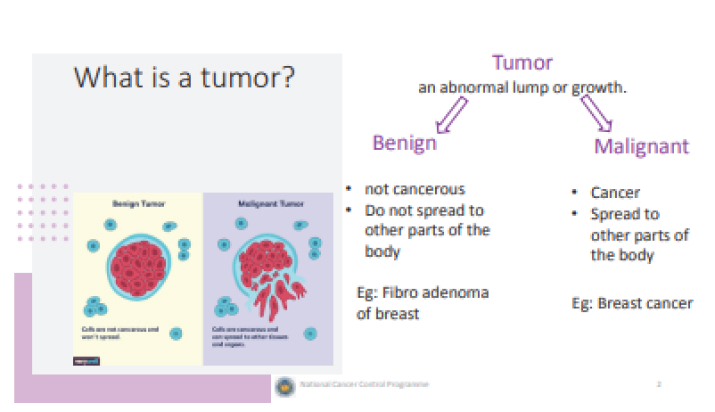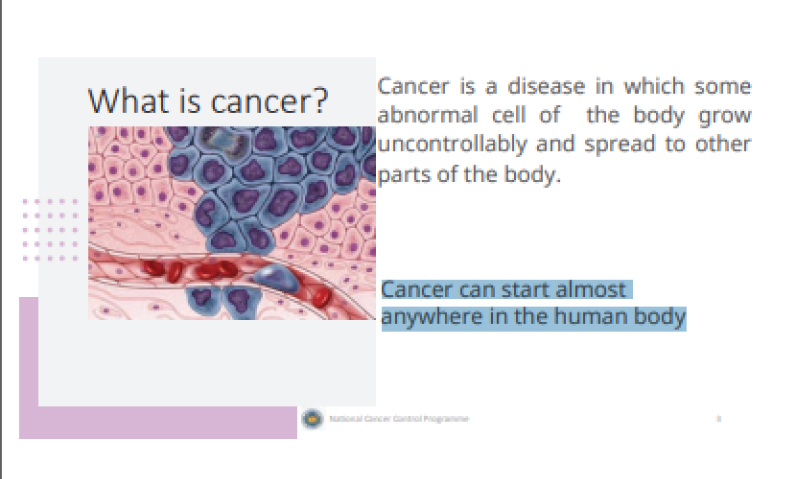Everything you need to know about breast cancer
Breast cancer is one of the most common types of cancer and can spread to other parts of your body. It attacks the tissue in one or both of your breasts. Breast cancer happens when cells stop working correctly, creating abnormal cells that grow uncontrollably. These cancer cells can form tumors and if left untreated, can spread to other parts of your body.
In this section :
1. What is a tumor?
2. What is cancer?
3. Am I at risk for breast cancer?
4. What are the symptoms of breast cancer?
5. What are some risk factors that can cause breast cancer?
6. How can I protect myself from breast cancer?
7. How often should I get a breast cancer screening?
1. What is a tumor?
A lump or a growth can be called a tumor. It can be benign or malignant. Malignant tumors can spread. But benign tumors do not spread to other parts of the body.

2. What is cancer?
It is a body of cells and where some cells divide and grow in a controllable manner. When some of the abnormal body cells grow/divide uncontrollably and spread to other parts of the body it can be called as a cancer. Cancer can be caused in any living tissue in the body.

3. Am I at risk for breast cancer?
Anyone can get breast cancer, but there are some things that can increase your risk, including
- Inherited mutations to genes (BRCA1 and BRCA2) that are related to breast cancer
- Being more than 50 years old
- Having a blood relative who has had breast or ovarian cancer
- Lifetime exposure to estrogen and progesterone hormones
- Women who experienced early menarche (before age 12) and late menopause ( after age 55)
- Women who do not have children or has their first child after the age of 30 years has higher risk
Having 1 or more risk factors does not mean you’ll definitely get breast cancer. And some people will get breast cancer without having any of these risks.
4. What are the symptoms of breast cancer?
The most common breast cancer symptom is a lump in your breast or in your armpit. Other things can also cause lumps, so finding one doesn’t definitely mean you have cancer. But it’s important to get checked out if you find a lump.
Here are some other possible signs of breast cancer:
- Swelling in your breast
- Dimples in the skin of your breast
- Pain in your breast or nipple
- Nipples that turn inward instead of sticking out
- Skin on your breast or nipple that’s discolored, flaky, scaly, or thicker than normal
- Discharge or blood coming out of your nipple
It’s also possible for breast cancer not to cause any noticeable symptoms until the disease has developed more. Breast cancer screenings can help find breast cancer before you notice symptoms.
5. What are some risk factors that can cause breast cancer?
- Being overweight and obese - post-menopausal obesity and overweight increases breast cancer risk
- Inadequate physical activity
- Unhealthy diet
- Tobacco and alcohol consumption (Second-hand smoking is also a risk factor)
- Hormone replacement therapy - Hormone therapy with estrogen increases the risk of breast cancer
6. How can I protect myself from breast cancer?
You can reduce your risk of getting breast cancer by having healthy habits. Breast cancer screenings don’t prevent the disease, but can catch it early, when it’s easier to treat.
Contact FPA Sri Lanka on 077 955 2979 to book your screening appointment.
Breastfeeding - Women who breastfeed their children have a slightly lower risk of breast cancer compared to women who never breast fed. This protective effect increases with increasing the duration of breast feeding. This could be partly because breast feeding reduces total number of menstrual cycles.
7. How often should I get a breast cancer screening?
Breast cancer screenings are based on both your age and your risk level. If you've never had breast or ovarian cancer and you don't have any relatives who've had either disease, it’s likely that your risk for breast cancer is average. You should:
- Get to know what your breasts feel like and let your doctor or nurse know if you find a lump or notice any other changes.
- Get a breast exam every 1-3 years from ages 25-39, and then every year after you turn 40.
- Get a mammogram every 1-2 years after you turn 40.
If you’ve had breast or ovarian cancer or have a relative who’s had it, you might be at a higher risk. Talk to your doctor to find out how often you should have breast exams and mammograms.
Contact FPA Sri Lanka on 077 955 2979 to book your screening appointment.
.png)


